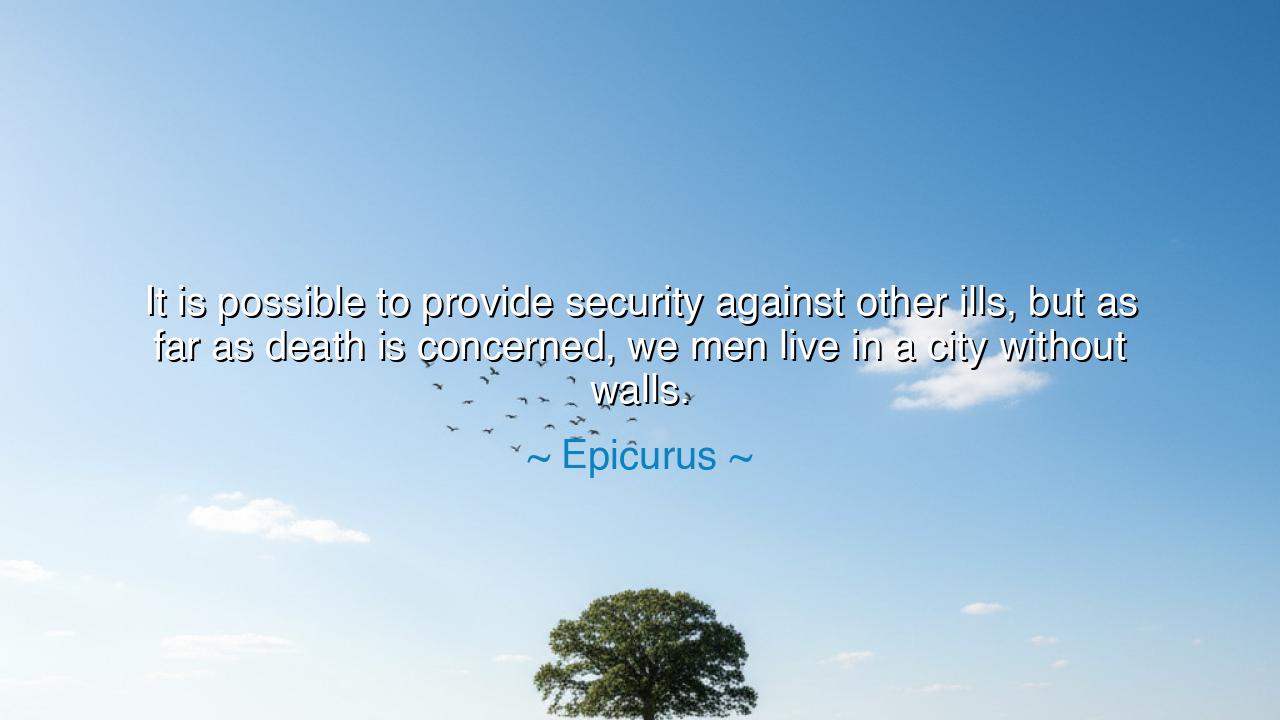
It is possible to provide security against other ills, but as far
It is possible to provide security against other ills, but as far as death is concerned, we men live in a city without walls.






The philosopher Epicurus, whose wisdom echoed through the marble halls of ancient Greece, once said: “It is possible to provide security against other ills, but as far as death is concerned, we men live in a city without walls.” In this single sentence, he captures the most humbling truth of human existence—that no matter how much we build, prepare, or protect ourselves, death remains beyond our fortifications. It is the inevitable visitor who enters uninvited, the shadow that moves with every light. While men have sought refuge from hunger, poverty, and pain, no city, no empire, no wisdom has ever kept death from entering its gates.
Epicurus was not a prophet of despair, but a teacher of peace. His purpose was not to frighten, but to free. In his view, men suffer less from death itself than from the fear of it. By saying that we live in “a city without walls,” he did not mean we are helpless; he meant we are equal. Kings and beggars, the young and the aged, the mighty and the meek—all share the same condition. Death is the one certainty before which all illusions fall away. Yet rather than mourn this truth, Epicurus invited us to embrace it, for to live in awareness of death is to live with clarity and gratitude.
The origin of this quote lies in the heart of Epicurean philosophy, which taught that happiness comes not from wealth or power, but from tranquility of mind—a state achieved through reason, friendship, and acceptance of nature’s order. Epicurus believed that death was not to be feared, for when we are alive, death is not with us; and when death arrives, we no longer exist to suffer it. In his eyes, the terror of death was an illusion—one that enslaves men to anxiety and steals the sweetness of the present moment. To see death clearly, to understand its natural place in the rhythm of existence, was to dismantle the walls of fear and finally walk free.
History itself offers proof of this wisdom. Consider the story of Socrates, who, condemned to die by poison, faced his final hour with calm and even joy. His friends wept, but he smiled, speaking of death as a journey to a place where truth would shine more purely. “No one knows,” he said, “whether death may not be the greatest blessing for man.” In that moment, he stood within Epicurus’s city without walls—unafraid, unguarded, yet serene. Socrates’ courage was not born from denial but from understanding. He knew that to fear death is to die before one’s time, and to accept it is to live fully until the end.
Epicurus’s teaching also serves as a mirror for our modern world, where people strive to fortify themselves against mortality. We build systems of medicine, wealth, and technology to extend life, as though the walls of the city might yet be raised high enough to keep death outside. Yet even in our age of progress, death remains unchanged. It comes not only at the end of a lifespan, but in every moment we cling too tightly to what must pass—our youth, our possessions, our pride. The wise do not fight this truth; they learn instead to live gently with it. They find freedom not in immortality, but in acceptance.
To understand Epicurus is to see that life’s fragility is not a curse, but a gift. If death cannot be delayed, then every breath becomes precious. The meal shared with friends, the laughter beneath the stars, the act of forgiveness—all are more radiant because they are fleeting. The walls we once wished to build against death now become unnecessary, for when we live with awareness, we no longer need protection—we are already at peace. The philosopher’s wisdom thus transforms the inevitability of death into a reason for joy, for in recognizing the end, we learn how to truly begin.
So, my child, take this lesson into your heart: Do not waste your strength in building walls against the inevitable. Instead, build within yourself the calm courage to face life and death alike. When fear of death visits, greet it as a teacher. When loss arrives, meet it with tenderness. And when joy comes, drink deeply, for every drop is sacred. We may live in a city without walls, but that does not make us weak—it makes us free. For those who accept death cease to be ruled by it, and in that acceptance, they find the greatest fortress of all: the untroubled soul.






AAdministratorAdministrator
Welcome, honored guests. Please leave a comment, we will respond soon